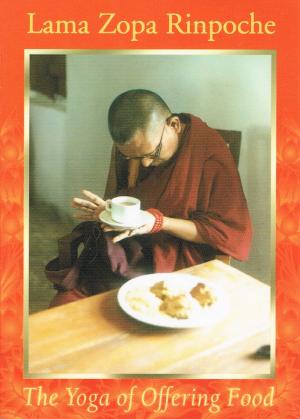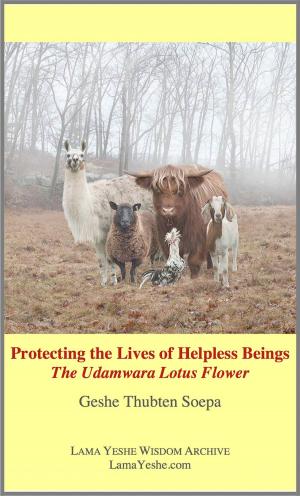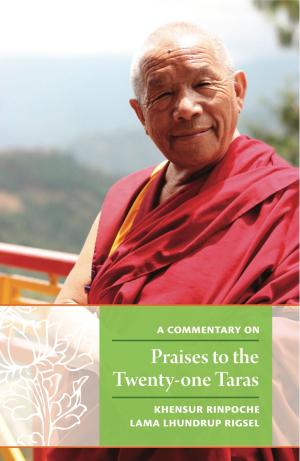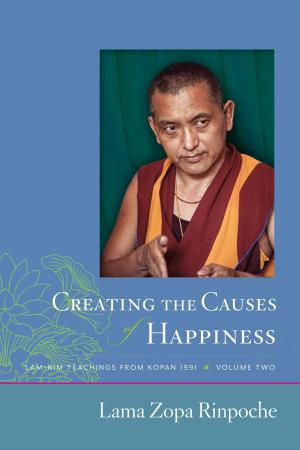Abiding in the Retreat: A Nyung Nä Commentary
Nonfiction, Religion & Spirituality, Eastern Religions, Buddhism| Author: | Lama Zopa Rinpoche | ISBN: | 9781891868702 |
| Publisher: | Lama Yeshe Wisdom Archive | Publication: | August 23, 2017 |
| Imprint: | Smashwords Edition | Language: | English |
| Author: | Lama Zopa Rinpoche |
| ISBN: | 9781891868702 |
| Publisher: | Lama Yeshe Wisdom Archive |
| Publication: | August 23, 2017 |
| Imprint: | Smashwords Edition |
| Language: | English |
Nyung nä means “abiding in the retreat.” In other words, you are retreating from negative karmas of body, speech and mind. When you hear, say or think of the word “nyung nä” don’t think only of fasting, of the physical practices involved. Don’t think a nyung nä is only about not eating—there is a much vaster meaning to think about.
Doing a nyung nä means your body is abiding in retreat, your speech is abiding in retreat and your mind is abiding in retreat. The essential meaning of retreat is retreat from nonvirtuous actions of body, speech and mind. Abstaining from negative karmas that harm others is the fundamental tantric practice.
- Lama Zopa Rinpoche
Abiding in the Retreat is a commentary to a nyung nä sadhana composed by Kälzang Gyatso, the Seventh Dalai Lama. Nyung nä is an intensive two-day retreat that combines meditation on Thousand-Arm Chenrezig and recitation of Chenrezig’s mantra, OM MANI PADME HUM, with prostrations, fasting and silence.
In this book, editor Ven. Ailsa Cameron has skillfully combined teachings on nyung nä practice given by Lama Zopa Rinpoche from 1984 through to 2009. The book contains the benefits of nyung nä retreat and of various practices within the retreat, stories of Chenrezig, Bhikshuni Lakshmi and the lineage lamas, and actual instructions on how to do a nyung nä.
This book is made possible by kind supporters of the Archive who, like you, appreciate how we make these teachings available in so many ways, including in our website for instant reading, listening or downloading, and as printed and electronic books.
Our website offers immediate access to thousands of pages of teachings and hundreds of audio recordings by some of the greatest lamas of our time. Our photo gallery, multimedia titles and our ever-popular books are also freely accessible there.
Please help us increase our efforts to spread the Dharma for the happiness and benefit of all beings. You can find out more about becoming a supporter of the Archive and see all we have to offer by visiting our website at http://www.LamaYeshe.com.
Nyung nä means “abiding in the retreat.” In other words, you are retreating from negative karmas of body, speech and mind. When you hear, say or think of the word “nyung nä” don’t think only of fasting, of the physical practices involved. Don’t think a nyung nä is only about not eating—there is a much vaster meaning to think about.
Doing a nyung nä means your body is abiding in retreat, your speech is abiding in retreat and your mind is abiding in retreat. The essential meaning of retreat is retreat from nonvirtuous actions of body, speech and mind. Abstaining from negative karmas that harm others is the fundamental tantric practice.
- Lama Zopa Rinpoche
Abiding in the Retreat is a commentary to a nyung nä sadhana composed by Kälzang Gyatso, the Seventh Dalai Lama. Nyung nä is an intensive two-day retreat that combines meditation on Thousand-Arm Chenrezig and recitation of Chenrezig’s mantra, OM MANI PADME HUM, with prostrations, fasting and silence.
In this book, editor Ven. Ailsa Cameron has skillfully combined teachings on nyung nä practice given by Lama Zopa Rinpoche from 1984 through to 2009. The book contains the benefits of nyung nä retreat and of various practices within the retreat, stories of Chenrezig, Bhikshuni Lakshmi and the lineage lamas, and actual instructions on how to do a nyung nä.
This book is made possible by kind supporters of the Archive who, like you, appreciate how we make these teachings available in so many ways, including in our website for instant reading, listening or downloading, and as printed and electronic books.
Our website offers immediate access to thousands of pages of teachings and hundreds of audio recordings by some of the greatest lamas of our time. Our photo gallery, multimedia titles and our ever-popular books are also freely accessible there.
Please help us increase our efforts to spread the Dharma for the happiness and benefit of all beings. You can find out more about becoming a supporter of the Archive and see all we have to offer by visiting our website at http://www.LamaYeshe.com.















